Greetings
Friends in the Name of Safety:
To
quote Sam Cooke, "A change is going to come!"
Safety Section UPDATE: As most of
you know, the Safety Education Section will
institute a fee for services beginning
December 1, 2009. Pamela Young, Chair of
the N.C. Industrial Commission will be making
the announcement within a couple of weeks.
The fee schedule will be announced at that
time. Thanks again for your continued
support!
The Other
News Is... We are still having the NC Zoo,
Asheboro Basic & Advanced APCAP program
October 26-30, 2009 for Basic and October 26
& 27, 2009 for Advanced. This will be the
last one before the fee schedule begins.
The ADVANCED class is FULL, but we still
have a few seats open for the BASIC
class.
To register for the Basic, please
CLICK HERE
80th Statewide Safety
Conference!
Mark your calendar now for
May 11-14,
2010! Eighty Years of Safety and
Counting...
|
Regional Safety Councils
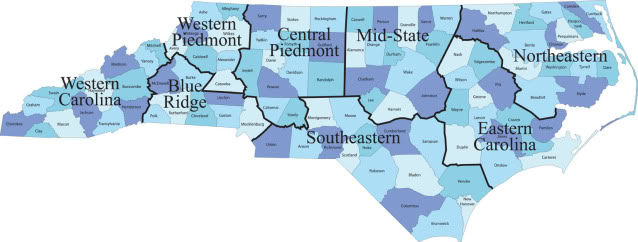
Please... don't forget to support your
Regional Safety Councils by joining
their membership ranks and participating
in their scheduled events. For
membership applications, see the Quick
Links to the right.
|
The Western Piedmont
Safety Council awarded their Lifesaving
Award to three individuals at it's
August meeting at the Smokey Bountain
Smokehouse & Creamery. Those in the
picture are, from left,
Doug Brookshire - Safety Director
for Bernhardt Furniture and Chairman of
the Western Piedmont Safety Council;
Charlie Steelman - an employee of Tyson
Foods in Wilkesboro; Henry Steelman - an
employee of Louisiana Pacific - Roaring
River; Justin Billings - an employee of
Louisiana Pacific - Roaring River; and
Dennis Parnell - Director of Safety
Education with the North Carolina
Industrial Commission in Raleigh.
Charlie and Henry Steelman received a
Life Saver Award from the Western
Piedmont Safety Council for saving the
life of a man who had fallen out of his
boat on March 23, 2009 on W. Kerr Scott
Reservoir. Justin Billings received a
Life Saver Award for his actions to help
save the life of a woman whose car had
gone into the river in Roaring River, NC
on February 19, 2009.
The Western Piedmont Safety
Council covers 8 counties and is
sponsored by the N.C. Industrial
Commission. The objective of the WPSC is
to promote safety in industry, home, and
public places with special emphasis
placed upon industrial
safety.
If you have a lifesaving experience you
believe would qualify for this award,
please contact your Regional Safety
Council for more information.
|
NCIC Video Library
Due to recent budget requirements,
we will discontinue our video
library on December 1, 2009.
At this time, we are not sure if
this will be permanent or short
term. Once a decision has been made,
we will inform you.
We apologize for any inconvenience.
|
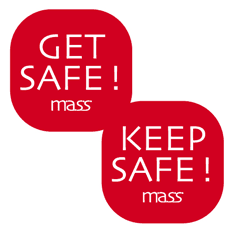
Keep S-A-F-E, Safe!
Remember these four steps
to safety
Prevent accidents on the job by staying
S-A-F-E, which stands for:
Stay alert.
Pay attention to your work. Avoid
becoming complacent or taking shortcuts,
no matter how many times you've done a
job. Be prepared for the unexpected.
Ask questions.
Don't take anything for granted. Check
with your supervisor when you are unsure
about a substance, procedure, or piece
of equipment. If you're not sure if
something is a hazard, ask. If something
seems wrong, but you're not sure what,
ask. Never let a safety question go
unanswered!
Focus on safety
problems.
Take time to look for hazards. Inspect
your work area, tools, equipment, and
materials before you start every job.
Anticipate potential problems and be
prepared to deal with any problems that
arise while you work.
E liminate hazards.
Take responsibility for your safety.
Follow safety rules. Used assigned PPE.
Keep your work area neat and safe.
Remove or repair safety hazards you're
trained to handle, and report the ones
you can't correct to your supervisor.
Make safety an important part of your
job-every minute of every day.
For more information, please give
Dennis a call at 919-218-3000 or email
Dennis.
|
|
My Laptop Bit Me!
 By
Michael Nance By
Michael Nance
I must admit,....I am not
as prepared for the monthly newsletter
as I usually am. I sometimes have 3 or 4
newsletter topics going on at the same
time; jotting down comments whenever
possible and even calling my home phone
to leave myself a note about a nifty
quote I heard. I honestly refrain from
trying to drive and write stuff down
while talking on the cell phone. If it's
too detailed, I pull over or ask someone
if I can call back. It's not worth the
risk and chance of getting into an
accident.
Speaking of "risk", how many of you back
up your computer files? I imagine most
of you have someone in the building
taking care of the business materials
and making sure back ups are made daily
and maybe even storing this offsite. You
may not think back up files are made,
but they are. It's just that you can't
get to them unless you're a pro in
hacking computers. Our section has
strived for over 80 years to prevent
accidents. One of those nifty quotes
that popped into my brain last week was:
"An ounce of prevention is worth a pound
of cure." Not sure,...but I know it went
something like that.
At the Nance home, we have three
computers (that work). One is the
regular desktop style that you don't
move. It has the big/bulky CRT monitor
that looks like a TV (I refuse to spend
the money on a flat LCD until the one I
have explodes). It's primarily the PC
(that's "Personal Computer") that the
kids use - games, research, games,
emails, and then some games. The PC
works fine but is years behind
technology. Then my wife has one she
uses for her school work (she's a high
school teacher). She's always doing
lesson plans, checking student homework,
emailing other teachers about meetings,
etc. It's very convenient for her and
allows her to do some work in the
comfort of the home instead of staying
late at school every day. The third PC
is mine. The one I'm using now.
My original laptop decided to take a
trip south without me about three weeks
ago. I lost everything. But wait,
there's more!!!! Yes, I made a backup of
my files; however, I did that about 3
months ago and really hadn't thought of
doing it again. The IT department in
Raleigh told me to bring it in and they
would see what they could do. I was
really hoping I could recover important
documents, safety photos, power points,
etc., but it was not meant to be. The
laptop was "re-imaged", or in my words,
"wiped clean". By the way, we call them
laptops but I rarely see one actually on
a person's lap. I was disappointed but I
knew I had backups at home; six CD's
worth and some memory sticks. Problem
is, the re-imaged laptop would not
recognize the files. Neither would the
backup laptop. Rats!!! Sure, I thought
of other words like "Hamster", "Dang It"
and maybe a few more.
Where is all this going? Simple. Make
back ups of your files now. Tonight when
you get home. Just like someone who is
bypassing a machine guard or another
safety rule, sooner or later it will
bite you back and it will be painful. I
spend hours recreating presentations and
other required files that I must keep.
My brain was like Jell-O several nights
in a row. Even though some photos are
gone and lost forever, I have been able
to find replacements. We have all heard
the phrase, "There is a silver lining in
every cloud", and I guess in my case, it
caused me to do what I had been putting
off. For example; the topic Blood Borne
Pathogens has not changed too much in
the past several years but I get drained
of presenting the same power points over
and over so I usually have 6 to 8
different ones to mix it up. I knew I
needed to redo many of our topics and I
was trying to find the time during
training sessions to do it. The laptop
crash caused me to buckle down after
hours and over the weekends to do just
that; refresh myself with many of the
topics and also refresh the power
points. Like seeing a movie for the
fifth time and noticing things you
didn't see or hear before. It's like an
"Ah-Ha" moment. Or perhaps a cool new
accident prevention idea that will also
save expenses. Then you want to share it
with others, try it out.
The average computer user doesn't think
much about problems that can arise with
a computer until a problem actually does
occur. That sort of sounds like some
upper management folks I used to work
with. Once a failure happens, repairs
can be both costly and time-consuming.
As with a good safety program,
preventive measures are the best tools
to keep things on track! Prevent a
catastrophe and get those files backed
up as soon as possible.
Editor's note: Michael Nance is the NCIC
Blue Ridge, Southern & Western Piedmont
areas Safety Representative. If you are
interested in having one of our programs
in your area, please give Michael a call
at 919-218-9047 or email him at
Michael.Nance@ic.nc.gov
|
If
Only They'd Paid Attention
Why safety meetings and training
are important
One of the best ways
to get the safety information you need to
avoid job accidents is in safety meetings
and training sessions. That's where you'll
learn what you have to know to protect
yourself and your co-workers from workplace
hazards.
Here are some true stories of workers who
probably didn't pay enough attention in
safety meetings and training sessions.
A worker's arm was crushed when he reached
into a conveyor belt mechanism to remove a
blockage. He turned the power off but didn't
lock out the conveyor. A co-worker who
couldn't see him turned the power back on.
An employee died
when he tried to stop a hazardous solvent
spill by turning off a valve instead of
following workplace rules to evacuate. He
wasn't wearing a respirator and was overcome
by toxic vapors.
A worker was
killed when a piece of metal he was cutting
bounced off the table and hit him in the
head. He wasn't wearing a required hard hat.
A worker in a
trench was killed in a cave-in because he
failed to properly shore up the sides.
Two workers were
killed when a crane fell over on them
because a co-worker had loaded the crane
above its rated capacity.
Both workers died
when an employee with no protective
equipmentor safety line tried to help a
co-worker who was overcome by cyanide gas
while cleaning a tank.
One employee died
and one was seriously injured because the
overloaded scaffold they were working on
collapsed, sending them 12 feet to the
ground.
An employee was
killed when she tried to slip past a backing
forklift. The operator didn't see the worker
behind him, and she was crushed between the
forklift and a wall.
If only these workers had paid
more attention in safety meetings and safety
training sessions, they would have known
that what they were doing was dangerous and
might result in an accident. Had they known,
they might have escaped injury or death.
Don't be like them! Be informed.
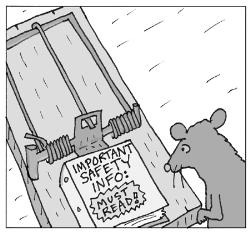 Now
you know. Dennis :) Now
you know. Dennis :)
|
Insight!?
Fun and useless tidbits

-
Smelling (not eating) green apples and
bananas help you to lose weight.
-
A hummingbird weighs
less than a penny.
-
Thomas
Edison was afraid of the dark.
-
Walt Disney was
afraid of mice.
-
The electric chair
was invented by a dentist.
-
Leonardo Di Vinci
invented the scissors.
-
Flies fly backwards.
-
You cannot hum while
holding your nose. (OK, tell the
truth. How many of you tried this?)
-
Apples are more
powerful than caffeine at helping to
stay awake.
-
Cat urine glows under
a black-light.
|
What Do You Know?
Don't draw a blank on safety information
Here's a quiz to test your
general safety knowledge.
- If you see a safety
hazard you can't safely fix yourself,
__________ it.
- Only use a fire
extinguisher to fight _______, contained
fires.
- The _________ on a
chemical container warns of safety and
health hazards.
- To protect workplace
security, report __________ individuals
or activities.
- _______________, such
as safety glasses and hard hats, are
personal barriers against job hazards.
- If you don't
understand a safety procedure or don't
know if something is a hazard, ask a
__________.
- A hazardous space
with limited entry and exit areas that
only trained, equipped, and authorized
personnel are allowed to enter is called
a __________ space.
- Never touch anything
electrical with _____ hands.
- When you have to lift
an object, lift with your _______
muscles.
- Places where fingers,
hands, or other body parts can get
caught between two surfaces or between
moving machine parts are known as
__________ points.
Answers at end of
Safety Bulletin.
|
|
How
to make the most of National
Preparedness Month, September 2009
This September marks the 6th Annual National
Preparedness Month sponsored by the U.S.
Department of Homeland Security's Ready
Campaign and Citizen Corps. The campaign is
designed to increase public awareness of
emergency preparedness at home, at work, and
in the community by providing free
information. The program promotes basic
steps to achieve true readiness in case of
disaster: get a kit, make a plan, be
informed, and get involved.
Get a kit:
Everyone should have an emergency kit at
home and at work with basic supplies. At
minimum, emergency kits should include:
first aid supplies, water, food,
flashlight and batteries, battery
powered or hand crank radio, and NOAA
Weather Radio. Families should be
prepared for a minimum of 72 hours
following a disaster. For a complete
supply list visit:
http://www.ready.gov/america/getakit/
Make a plan:
Planning is key to being prepared when an
emergency strikes. Plans should include how
to communicate with loved ones, where to
reunite if separated, how to decide if you
should evacuate or shelter-in-place, and
where to find the disaster kit and
additional supplies.
Be informed: Information
allows you to make decisions that will
impact how you respond to an emergency. Know
what emergencies are possible where you live
and how to effectively prepare for them.
Learn what resources are available in your
area and what emergency plans are in place
for your city, county, and state.
Get involved:
The final step promoted during Emergency
Preparedness Month is to get involved in
your community preparedness. On Ready.gov's
website groups can register to become part
of the National Preparedness Month
Coalition. Coalition members are
organizations who pledge to share
preparedness information with their
families, coworkers, customers, and
communities. In 2008, more than 3,200
organizations served as Coalition members.
Visit
http://www.ready.gov/america/npm09/members.html
to see if your group has already
registered and how you can get involved. If
your organization has not joined, consider
becoming a member to share the message of
preparedness with your community.
For more information, visit the Campaign's
Web site and toll-free numbers
(1-800-BE-READY and 1-888-SE-LISTO).
Ginny Schwartzer
is Vice President / Owner of
All Clear Emergency Management Group,
a planning and preparedness firm providing
focused emergency management services to
hospitals, healthcare facilities, schools,
universities, churches, religious
organizations, and businesses. She can
assist with your organization's plans to be
truly ready for an emergency. She can be
reached at 336-802-1800 or by
Email.
|
 Wake
Up and Be Safe! Wake
Up and Be Safe!
Don't let
drowsiness cause accidents
Sleep experts say many people don't get
enough sleep. Statistics show that as many
as 40 percent of Americans say that they've
been sleepy enough during the day that it
interferes with their daily activities. And
that can have a negative impact on workplace
safety.
To counteract drowsiness on the job
and prevent accidents:
- Take a minibreak and
do some stretching exercises right at
your workstation.
- Go to the restroom
and splash cold water on your face.
- Take a walk during
your rest break to help refresh and wake
you up.
- Drink a caffeinated
beverage.
Avoid tasks that
require sharp physical or mental skills when
you're very tired. For example, operating
machinery, driving a vehicle or forklift, or
handling hazardous materials could be
dangerous if you're not fully alert.
- Be honest and don't
put yourself or others at risk.
- Switch to a less
risky task, if possible, until you feel
more awake.
- Talk with your
supervisor if you're concerned about
your abilities-or someone else's. Also
talk to your supervisor if you're taking
a medication that makes you feel drowsy
and could put you or a co-worker at
risk.
There's a direct connection
between fatigue and accidents. So keep
alert!
|
Why Organize? 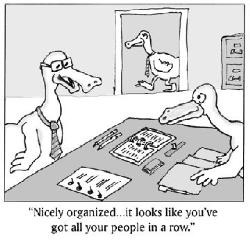
Ten ways
organization helps you succeed
Why bother spending all that time
getting organized on the job?
Because being organized helps you:
-
Save time.
When you know what you're going to
do and how you're going to do it,
and when you have all the materials
and equipment you need before you
start, you won't waste time once you
get going.
-
Avoid stress.
Instead of running around looking
for the things you need and facing
all kinds of frustrations while
you're busy trying to get a job
done, you'll have everything all
lined up waiting for you when you
need it.
-
Anticipate needs,
problems, and choices.
When you organize, you're better
able to anticipate what is required
to do a job well, what problems you
might face, and what options you
might have. Instead of jumping in
blind, you'll go into the job with
your eyes open, prepared for
anything that might arise.
-
Make better
decisions. Because
you've organized and anticipated,
you'll be able to make better
decisions faster as you work.
-
Be more efficient and
productive. You
won't waste time and energy or have
to backtrack to deal with something
you forgot.
-
Make sure priorities
are met. You'll have
organized your tasks in the logical
order that allows you to meet your
priorities.
-
Handle challenges and
problems more effectively.
You'll be able to handle challenges
or problems while you work because
you'll already have the resources to
deal with unexpected events.
-
Evaluate progress.
Because you've already planned out
your work, you'll know how well
you're getting along and how much
more you have to do. That will help
you keep on schedule and finish your
work on time.
-
Meet goals.
An organized approach to your work
ensures that you will meet-or even
exceed-your goals.
-
Achieve better
results. Finally,
being organized helps you achieve
better results, which is the basis
for professional success and
personal satisfaction.
|
What Folks Are Saying...
Dennis,
Thank you so much for speaking
at our pre-outage safety
meeting. I appreciate you taking
time out of your busy schedule
to accommodate us. You delivered
a good message that was well
received by everyone. If there
is ever anything I can do to
help you, please let me know.
Thanks Again,
Jeff Lamm
Operations Manager
Roanoke Valley Energy
Weldon, NC
|
Sleep
Poll Revealing
According to a recent
Sleep in America poll by the
National Sleep Foundation, American
adults average 6.9 hours of sleep a
night. But 16 percent of those
polled said they get less than 6
hours on weeknights. And only half
the people polled thought that they
were getting enough sleep.
Twenty-four percent said that sleep
problems affected work and other
activities. Half said they often
feel tired, and 17 percent said they
feel tired every day.
Nearly one in three said they had
missed work or made mistakes because
of lack of sleep. Sixty percent of
drivers polled admitted to driving
while drowsy, and 4 percent said
they'd had an accident or near miss
because of fatigue.
One of the biggest culprits for lost
sleep was a partner's
snoring-costing an average of 49
minutes of lost sleep a night. The
poll also indicates that people with
medical conditions like arthritis
and high blood pressure sleep less
and are twice as likely to feel
tired during the day.
Weight problems are also linked to
loss of sleep. Overweight people
tend to get less sleep and feel more
tired during the day than people of
normal weight.
How do Americans prepare for sleep?
Ninety percent said they watched TV.
How do we make up for lost sleep?
More than 50 percent of the survey
group took at least one nap a week.
|
|
Answers:
(1) Report (2) Small (3) Label (4)
Suspicious (5) Personal protective
equipment (PPE) (6) Supervisor (7)
Confined (8) Wet (9) Leg (10) Pinch
|
|
About N.C. Industrial Commission
Safety Section
The N.C. Industrial Commission
Safety Education Section stands ready to
assist you with your Safety training needs.
We offer a variety of courses, designed to
suit your needs. Please give one of our
Industrial Safety Representatives a call.
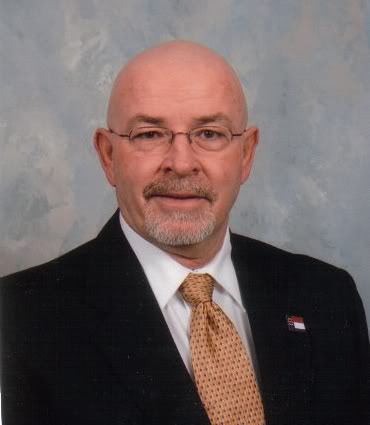 DENNIS
PARNELL DENNIS
PARNELL
Director Safety Education
919-218-3000-Cell
919-807-2602
Dennis.Parnell@ic.nc.gov
 KIM
NADEAU
Program Assistant
919-807-2603
919-218-9049-Cell
Kim.Nadeau@ic.nc.gov
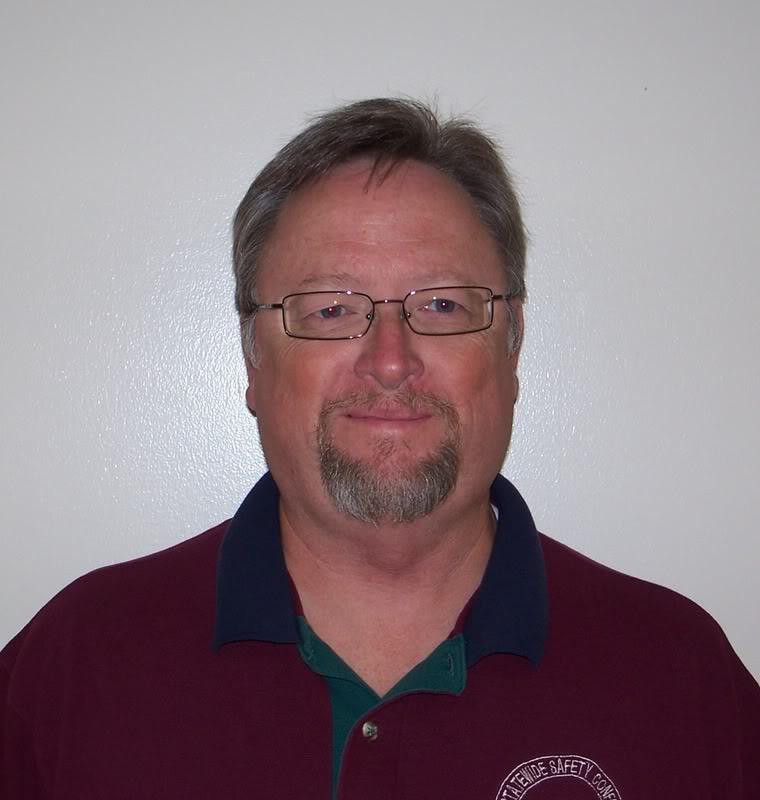 RANDY
CRANFILL RANDY
CRANFILL
Western Carolina Area & APCAP & APW
Coordinator
919-218-2986
Randy.Cranfill@ic.nc.gov
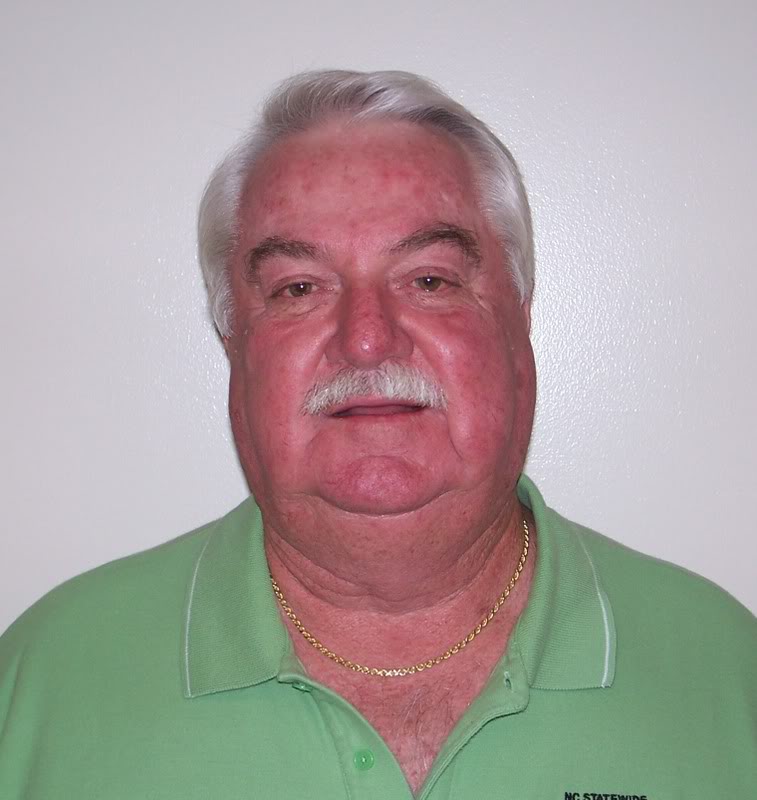 ALVIN
SCOTT ALVIN
SCOTT
Eastern & Northeastern Areas, Eastern
Defensive Driving Instructor
919-218-2792
Alvin.Scott@ic.nc.gov
WE ARE WORKING FOR YOU!
|
|
|
|
Quick Links
General
Industry
|
|
Quick Links
Fleet Safety
Law
and condition dictate top speed
|
|
Quick Links
CENTRAL
PIEDMONT SAFETY COUNCIL
Membership
Brochure
|
|
Quick Links
EASTERN
CAROLINA SAFETY COUNCIL
Membership
Brochure
|
|
Quick Links
SOUTHEASTERN SAFETY COUNCIL
Membership
Brochure
|
|
Quick Links
WESTERN
PIEDMONT SAFETY COUNCIL
Membership
Brochure
|
|
Quick Links
MID-STATE
SAFETY COUNCIL
Membership
Brochure
|
|
Quick Links
BLUE RIDGE SAFETY COUNCIL
Membership Brochure
|
|
Quick Links
NORTHEASTERN SAFETY COUNCIL
Membership Brochure
|
|
Quick Links
WESTERN
CAROLINA SAFETY COUNCIL
Membership Brochure
|
|
Quick Links
NC RURAL WATER ASSOCIATION
|
|
Quick Links
SIGN-UP FOR OUR NCIC SAFETY
BULLETIN
Email/Newsletter
|
|
Quick Links
news & notes
SUBSTANCE ABUSE AND SAFETY
September is National Alcohol and Drug
Addiction Recovery Month.
Why talk about this? Because the majority of
Americans abusing drugs, alcohol, or both
are employed. And their abuse problem almost
always causes a safety problem.
People working under the influence of drugs
or alcohol are three times more likely to
have accidents. And they may not be the only
ones hurt. Co-workers are often injured as a
result of someone else's substance abuse on
the job.
Think about these facts:
-
Some 6.5 percent of full-time and 8.6
percent of part-time workers are current
illegal drug users.
-
Alcohol is the most widely abused drug
among working adults. An estimated 6.2
percent of adults working full time are
heavy drinkers.
-
Of 12.4 million heavy drinkers, 30.5
percent are also current illegal drug
users.
-
More than 60 percent of working
Americans know someone who has reported
for work under the influence of alcohol
or other drugs.
-
Up to 40 percent of workplace fatalities
and 47 percent of injuries are linked to
substance abuse.
Now's the time to take action
if you or someone you know has a problem.
Awareness of the problem and of treatment
options is the first step to a healthier,
safer life. The next step is getting help.
And help is just a phone call
away.Call your
NCIC AREA SAFETY CONSULTANT!
|
|
Quick Links
ARE YOU READY?
Are you ready for the next safety meeting or
safety training session?
-
Are your mind, eyes, and ears open and ready
to see, hear, and learn what you need to
know to prevent accidents, injuries, and
illnesses
-
Do you have paper and a pen so you can take
notes about points brought up during the
meeting?
-
Are you prepared to participate in the
session by asking questions, raising safety
concerns, sharing your knowledge and
experience, and giving your advice and
suggestions when appropriate?
-
Are you ready to listen to what co-workers
say about the topic being discussed and to
hear their concerns about safety?
-
Are you willing to take what you learn back
to work and use it?
If your answer to all these questions is "yes,"
then yes, you are ready.
DON'T BE AFRAID
TO ASK QUESTIONS
Sometimes people think that they're
just supposed to show up at safety meetings and
training sessions to listen, that they're not
supposed to talk. But that's not true.
Don't be afraid to ask questions if
there's anything you don't understand. And don't
hesitate to speak up if you have something
useful to contribute. Participation is an
important part of learning.
Give us a call...
|
FOCUS ON THE
FIVE S's
The Japanese have long recognized the vital
importance of being well organized on the
job. Most companies in Japan follow a simple
but rigorous program known as the Five S's,
which helps keep work areas orderly and
efficient:
-
Seiri,or sorting, refers
to the practice of sorting through all
the tools, materials, etc., in the work
area and keeping only essential items.
Everything else is stored or discarded.
This leads to fewer hazards and less
clutter to interfere with productive
work.
-
Seiton,or organizing,
focuses on the need for an orderly
workplace. Tools, equipment, and
materials must be systematically
arranged for the most efficient access.
In other words, a place for everything
and everything in its place.
-
Seiso,which means
cleaning, indicates the need to keep the
workplace clean as well as neat. At the
end of each shift, the work area is
cleaned up and everything is restored to
its place.
-
Seiketsu, or
standardizing, allows for control and
consistency. Basic housekeeping
standards apply throughout the facility.
Everyone knows his or her
responsibilities. Housekeeping duties
are part of regular work routines.
-
Shitsike, which means
sustaining, refers to maintaining
standards and keeping the work area in
an efficient and orderly state, day
after day, year after year.
|
|